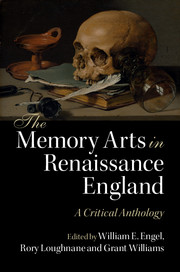Book contents
- Frontmatter
- Dedication
- Contents
- List of figures
- Acknowledgements
- A note on abbreviations
- Introduction
- PART I The art of memory
- PART II Rhetoric and poetics
- PART III Education and science
- PART IV History and philosophy
- Introduction to Part IV
- IV.1 Lodowick Lloyd, The Pilgrimage of Princes (1573)
- IV.2 William Camden, Remains Concerning Britain (1605)
- IV.3 Francis Bacon, The Advancement of Learning (1605)
- IV.4 Pierre Charron, Of Wisdom (1608)
- IV.5 John Weever, Ancient Funeral Monuments (1631)
- IV.6 Edward Reynolds, A Treatise of the Passions and Faculties (1640)
- IV.7 Thomas Fuller, selected works
- IV.8 Kenelm Digby, Two Treatises (1644)
- IV.9 Thomas Hobbes, Leviathan (1651)
- IV.10 William Dugdale, Baronage of England (1675–1676)
- PART V Religion and devotion
- PART VI Literature
- Index
- References
IV.6 - Edward Reynolds, A Treatise of the Passions and Faculties (1640)
from PART IV - History and philosophy
Published online by Cambridge University Press: 05 August 2016
- Frontmatter
- Dedication
- Contents
- List of figures
- Acknowledgements
- A note on abbreviations
- Introduction
- PART I The art of memory
- PART II Rhetoric and poetics
- PART III Education and science
- PART IV History and philosophy
- Introduction to Part IV
- IV.1 Lodowick Lloyd, The Pilgrimage of Princes (1573)
- IV.2 William Camden, Remains Concerning Britain (1605)
- IV.3 Francis Bacon, The Advancement of Learning (1605)
- IV.4 Pierre Charron, Of Wisdom (1608)
- IV.5 John Weever, Ancient Funeral Monuments (1631)
- IV.6 Edward Reynolds, A Treatise of the Passions and Faculties (1640)
- IV.7 Thomas Fuller, selected works
- IV.8 Kenelm Digby, Two Treatises (1644)
- IV.9 Thomas Hobbes, Leviathan (1651)
- IV.10 William Dugdale, Baronage of England (1675–1676)
- PART V Religion and devotion
- PART VI Literature
- Index
- References
Summary
About the author
Edward Reynolds (1599–1676) became a leading moderate among the English Presbyterians, eventually helping to re-establish England's episcopate during the Restoration of the king. At this time, he accepted the bishopric of Norwich. Reynolds was a gifted preacher and a prolific author of more than thirty books.
About the text
Reynolds calls his treatise ‘this Morall and Philosophicall Glasse of the humane Soule’ (A2v). Drawing upon a blend of classical and theological sources, he surveys the moral implications of the concupiscible and irascible passions and the other faculties within interiority. The excerpt occurs in a chapter about humanity's noblest desire: that of knowledge, to which the faculty of understanding is devoted. There are three mental attributes required to perfect knowledge: clearness of apprehension, solidity of judgement and fidelity of retention.
The arts of memory
The passage reveals the degree to which the architectural trope of the artificial memory could extend into considerations of the natural memory. Reynolds seems to imply that the mind functions as the raw timber for possible memory palaces. In Reynolds's view, scholarly fashioning begins with choosing minds properly predisposed to learning. It is this timber's quality that yields the happiness or melancholy of those who seek knowledge. To illustrate these two emotional states of learning, Reynolds catalogues examples of ancients noted for either forgetting or recollecting, imitating Pliny's locus classicus on the wonders of strong and weak memories.
Textual notes
Edward Reynolds, A treatise of the passions and faculties of the soule of man (London, 1640), HHH3v–HHH4v.
A Treatise of the Passions and Faculties
Chapter XXXVII
[…]
Thirdly, fidelity of retention: for he is not likely to grow rich, who puts up his treasure as the prophet speaks, into a bag with holes. For as nature hath given to the bodies of men for the furtherance of corporeal strength and nutriment a retentive power to clasp and hold fast that which preserveth it, until a thorough concoction be wrought; so proportionably is the faculty of memory given to reason, as a means to consolidate and enrich it. And fluxes, as in the body, so in the mind too, are ever arguments and authors of weakness.
- Type
- Chapter
- Information
- The Memory Arts in Renaissance EnglandA Critical Anthology, pp. 208 - 211Publisher: Cambridge University PressPrint publication year: 2016



